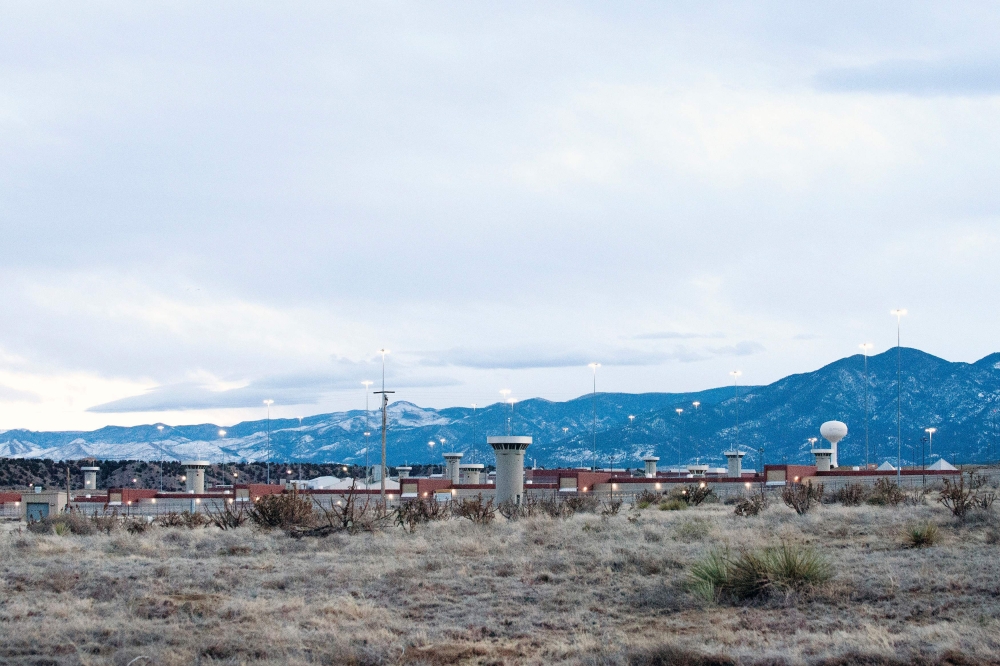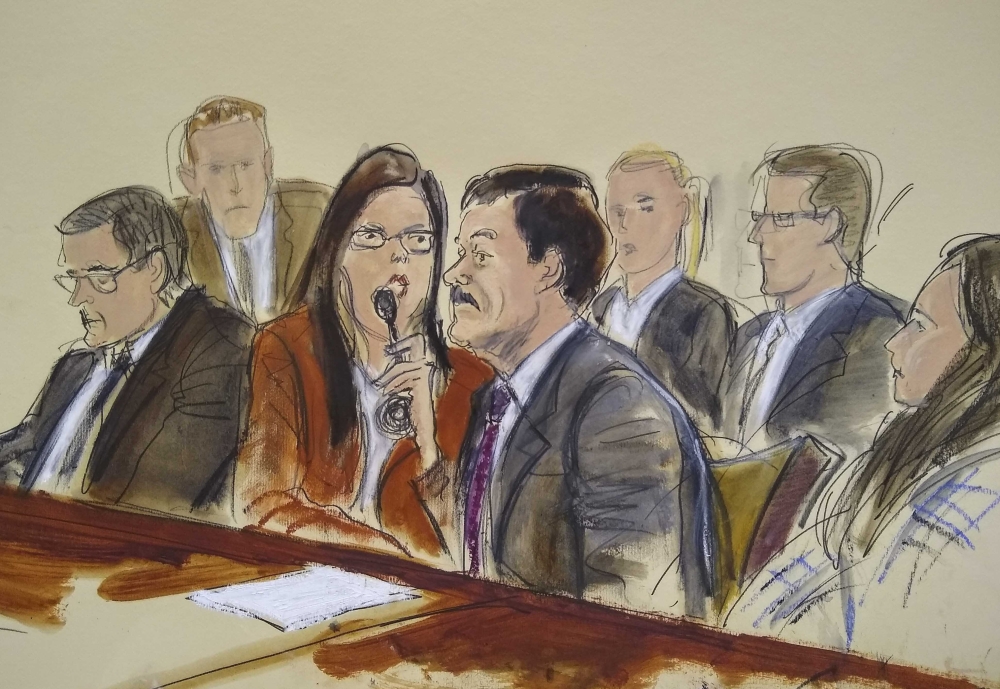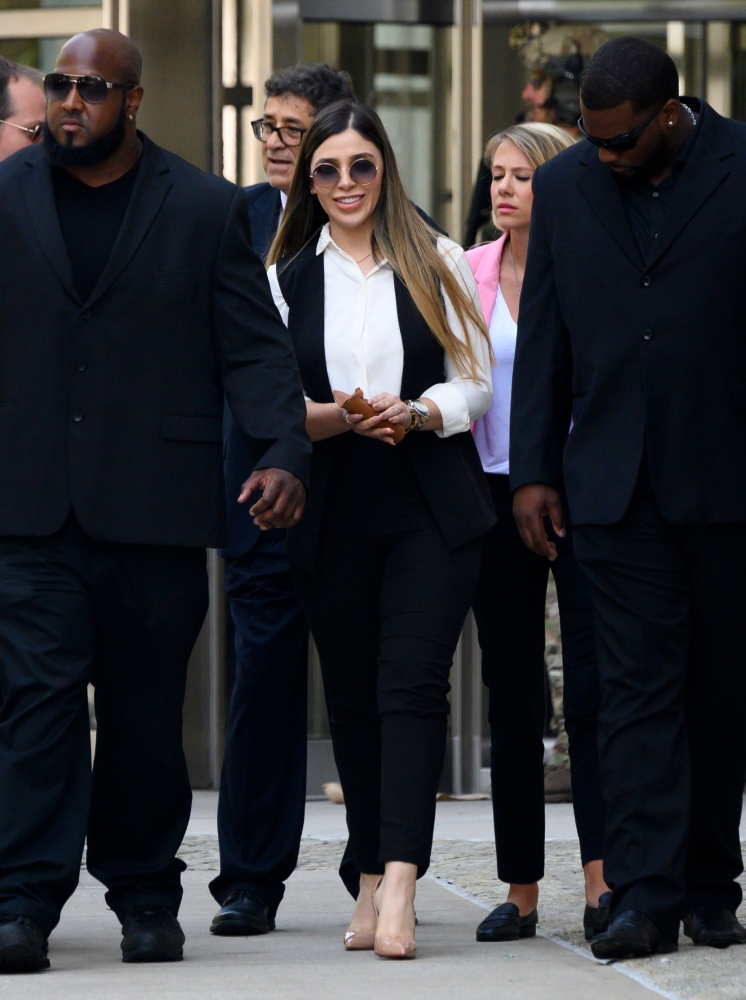- City Fajr Shuruq Duhr Asr Magrib Isha
- Dubai 04:18 05:40 12:28 15:52 19:10 20:33

Photo: AFP
Fallen Mexican drug lord Joaquin "El Chapo" Guzman was locked up Friday at the ADX federal maximum security prison in the US state of Colorado, where he will spend the rest of his days.
"We can confirm that... Guzman is in the custody of the Federal Bureau of Prisons" at the Administrative Maximum (ADX) site in Florence, central Kansas, read a short email from the prisons bureau.
Guzman, the 62-year-old former co-leader of Mexico's feared Sinaloa drug cartel, was convicted in February of smuggling hundreds of tons of cocaine, heroin, methamphetamine and marijuana into the United States.

In a New York courtroom on Wednesday he was sentenced to life in prison, and sent to the notorious supermax prison nicknamed the "Alcatraz of the Rockies."
Guzman - who escaped Mexican prisons in 2001 and 2015 - will find it nearly impossible to slip out of the ADX, built in 1994 and located in a remote mountainous desert region of the western US state.
Current ADX inmates include convicted "Unabomber" Ted Kaczynski, Oklahoma City bomber Terry Nichols, the British "shoe bomber" Richard Reid and the Boston marathon bomber Dzhokhar Tsarnaev, who is awaiting execution.
The most dangerous prisoners are allowed out of their small steel and concrete cell for only 90 minutes a day - and they must wear shackles on their hands and feet.
From crime boss to prison inmate

Photos: AFP
Guzman was extradited to the United States in January 2017, and was being held in solitary confinement at New York's Metropolitan Correctional Center (MCC) in a windowless cell that was constantly lit.
Compared to that, "ADX will be like a walk in the park for him," Guzman's attorney Jeffrey Lichtman told reporters on Wednesday.
Guzman described his 30 months at the MCC prison to US Federal Judge Brian Cogan as around the clock "emotional, psychological and mental" torture.
Cogan granted a request by Lichtman to let the former Mexican drug lord stay at the MCC for up to 60 days while his case was appealed.
Federal prison officials opted instead to immediately move him to the Colorado prison.
Guzman's "ability to defend himself has never been a concern for the government," Lichtman said in an email to AFP.
Guzman - whose moniker "El Chapo" translates as "Shorty" - is considered the most influential drug lord since Colombia's Pablo Escobar, who was killed in a police shootout in 1993.
El Chapo was whisked away within hours of sentencing
Only hours after receiving a life sentence, convicted Mexican drug lord Joaquin “El Chapo” Guzman was forced to make a sudden departure to the highest-security prison in the U.S. to serve the term, his lawyer said Thursday.
A government helicopter whisked the narco, notorious for his daring jailbreaks, out of New York City on Wednesday after the sentencing in federal court in Brooklyn, said defense attorney Jeffrey Lichtman. The lawyer said he was informed that his client was en route to the supermax facility in Florence, Colorado.
For most defendants, there’s a lag between sentencing and a decision by the Bureau of Prisons on where to house them. In Guzman’s case, U.S. District Judge Brian Cogan agreed at the close of his sentencing to recommend to the bureau that it let Guzman stay at a federal jail in Manhattan for two more months to help his lawyers mount an appeal.

Photo: AP
It’s now clear that behind the scenes, there already was a plan in place “to get him out of the city as soon as possible,” Lichtman said.
Prison officials and prosecutors wouldn’t talk about Guzman’s whereabouts on Thursday.
The 62-year-old Guzman had been the subject of extreme security measures carrying an untold cost ever since his extradition to the U.S. in 2017 to face drug-trafficking charges. Authorities were determined to prevent any repeat of Guzman’s legendary jailbreaks in Mexico, including the one in 2015 involving a mile-long (1.6 kilometer-long) tunnel dug to the shower in his cell.
Guzman was put in solitary confinement in a high-security wing of the Manhattan jail that has housed terrorists and mobsters.
“I drink unsanitary water, no air or sunlight, and the air pumped in makes my ears and throat hurt,” he said at sentencing. “This has been psychological, emotional and mental torture 24 hours a day.”
For pretrial hearings in Brooklyn, authorities transporting Guzman to and from jail shut down the Brooklyn Bridge to make way for a police motorcade that includes a SWAT team and an ambulance, all tracked by helicopters. Once the trial started, they secretly kept him locked up in the bowels of the courthouse during the week to make the logistics less arduous.
The apparent next — and last — stop for Guzman: a prison sometimes called the “Alcatraz of the Rockies.”
Unabomber Ted Kaczynski, Boston Marathon bomber Dzhokhar Tsarnaev, Sept. 11 conspirator Zacarias Moussaoui and Oklahoma City bombing accomplice Terry Nichols are among those who call it home.
Mexican druglord 'El Chapo' sentenced to life in jail
A US court sentenced Joaquin "El Chapo" Guzman to life in prison Wednesday plus a symbolic 30 years, ordering the former mob boss to pay back $12.6 billion of the proceeds of his crimes.
Once the world's most notorious druglord, the 62-year-old former co-leader of Mexico's Sinaloa drug cartel was convicted in February of crimes spanning a quarter century, including trafficking hundreds of tons of cocaine, heroin, methamphetamines and marijuana into the United States.

Emma Coronel Aispuro, wife of Joaquin "El Chapo" Guzman (AFP)
Trial of 'El Chapo': rare glimpse inside the drug world
The trial of Mexican drug lord Joaquin "El Chapo" Guzman provided a rare and terrifying look into the workings of one of the world's largest cartels.
Over the space of nearly three months, a New York jury heard 56 government witnesses deliver dramatic evidence against Guzman.
According to the witnesses, the Sinaloa cartel, of which Guzman was a co-leader, flooded the United States with cocaine with the blessing of countless police, military officers and Mexican officials -- going all the way up to the president -- who turned their heads in exchange for bribes worth millions.
On February 12, a jury found Guzman guilty of crimes spanning a quarter century, and on Wednesday, a judge is expected to sentence him to life in prison.
Here is a summary of some of the highlights of the trial:
Torture and killings
Isaias Valdez Rios, described as a hired killer for El Chapo, testified that he saw the drug kingpin torture and execute three rival traffickers, burying one of them alive. The two others had bones broken before being killed. Their bodies were then burned.
Other witnesses said they had seen El Chapo order kidnappings and killings of rivals or of police who refused to accept bribes. They said El Chapo had a permanent security guard of perhaps 100 men armed with pistols, automatic weapons, grenades and rocket launchers.
Bribes
Two former partners of Guzman testified that he paid millions of dollars in bribes to senior officials of the Mexican government to hunt down rivals, expand his business, and dodge the authorities and police at all levels - and even within Interpol.
His attorney Jeffrey Lichtman said Guzman also bribed two Mexican presidents - Enrique Pena Nieto and Felipe Calderon - but they denied this.
'Chupeta'
With his face disfigured by repeated rounds of plastic surgery to conceal his identity, Juan Carlos "Chupeta" Ramirez, a former boss of a Colombian drug cartel, testified that with help from Guzman, he smuggled more than 400 tons of cocaine to the US from 1989 until his own arrest in 2007.
Ramirez, who said he had ordered the death of some 150 people and was one of Guzman's main cocaine suppliers, said he did business with the latter - paying him with drugs - because he managed to get the merchandise to the US "very quickly."
A steep price markup
El Chapo's accountant, Jesus Zambada, told the jury how El Chapo purchased Colombian cocaine for $3,000 a kilo and then sold it in New York for $35,000 a kilo.
All the drugs, an average of 80 to 100 tons a year, were sent to the United States, he said.
Compromising recordings
With the help of Christian Rodriguez, a Colombian who was El Chapo's communications chief, US government agents intercepted some 200 conversations between the cartel boss and his associates, hired killers, and corrupt Mexican officials.
Investigators also intercepted encrypted messages between El Chapo and others, sent on Blackberries that the trafficker used to spy on his associates and his mistresses.
In one message read to the jury, El Chapo speaks with associate known as "la Fiera" about setting up dummy corporations in Germany and Ecuador in order to export drugs "to Europe, to Canada, to Australia and to the United States."
They also discuss the purchase in Belize of 700 kilograms (1,540 pounds) of cocaine.
Airplanes full of dollars
El Chapo's former pilot and business manager, Miguel Angel "Gordo" Martinez, testified that the cartel boss would sometimes receive as many as three cash-filled airplanes from the United States in a single day. Each plane carried "eight to 10 million dollars," he said.
He also told how El Chapo worked with Colombian suppliers to finance deliveries of up to 14 tons of cocaine - transported by boat to international waters off Mexico, where Colombian crews would hand over the drugs to El Chapo's employees.
Martinez estimated that from 1990 to 1993, El Chapo thus imported 25 to 30 tons of cocaine into Mexico each year.
El Chapo awaits life in prison sentence by US judge
After a run as one of the world's most powerful and notorious criminals, Joaquin "El Chapo" Guzman is expected to be sentenced to life in prison when he appears in a New York courtroom on Wednesday.
Guzman, the 62-year-old former leader of the powerful Sinaloa drug cartel, was convicted in February of crimes spanning a quarter of a century, including trafficking hundreds of tons of cocaine, heroin, methamphetamines and marijuana to the United States.
The charges, which also include money laundering and weapons-related offenses, carry a mandatory life sentence.
Last week, prosecutors asked US federal judge Brian Cogan to tack on a symbolic extra 30 years in prison for the use of firearms in his business, portraying Guzman as "ruthless and bloodthirsty."
They also want Guzman to turn over $12.7 billion, based on a conservative estimate of revenues from his cartel's drug sales in the United States. So far, US authorities have not recovered a dime.
Guzman is considered to be the most powerful drug lord since Colombia's Pablo Escobar, killed in a police shootout in 1993.
"El Chapo" ("Shorty") was the co-leader of the still-powerful Sinaloa organization.
During the three-month trial in New York, jurors heard evidence of Guzman's misdeeds. Witnesses described the cartel boss beating, shooting and even burying alive those who got in his way, including informants and rival gang members.
At least one of Guzman's victims - a woman who prosecutors say survived a hit ordered by the kingpin - will speak at Wednesday's sentencing hearing.
![]() Follow Emirates 24|7 on Google News.
Follow Emirates 24|7 on Google News.